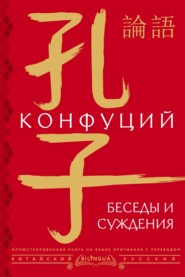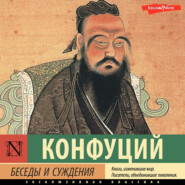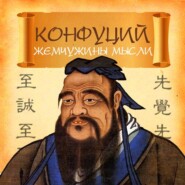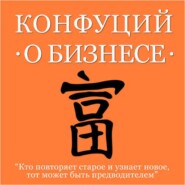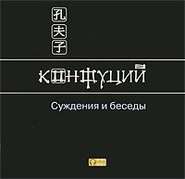По всем вопросам обращайтесь на: info@litportal.ru
(©) 2003-2024.
✖
Chinese Literature
Автор
Год написания книги
2018
Настройки чтения
Размер шрифта
Высота строк
Поля
"Duke King of Ts'i had his thousand teams of four, yet on the day of his death the people had nothing to say of his goodness. Peh-I and Shuh-Ts'i starved at the foot of Shau-yang, and the people make mention of them to this day.
'E'en if not wealth thine object be,
'Tis all the same, thou'rt changed to me.'
"Is not this apropos in such cases?"
Tsz-k'in asked of Pih-yu, "Have you heard anything else peculiar from your father?"
"Not yet," said he. "Once, though, he was standing alone when I was hurrying past him over the vestibule, and he said, 'Are you studying the Odes?' 'Not yet,' I replied. 'If you do not learn the Odes,' said he, 'you will not have the wherewithal for conversing,' I turned away and studied the Odes. Another day, when he was again standing alone and I was hurrying past across the vestibule, he said to me, 'Are you learning the Rules of Propriety?' 'Not yet,' I replied. 'If you have not studied the Rules, you have nothing to stand upon,' said he. I turned away and studied the Rules.—These two things I have heard from him."
Tsz-k'in turned away, and in great glee exclaimed, "I asked one thing, and have got three. I have learnt something about the Odes, and about the Rules, and moreover I have learnt how the superior man will turn away his own son."
The wife of the ruler of a State is called by her husband "My helpmeet." She speaks of herself as "Your little handmaiden." The people of that State call her "The prince's helpmeet," but addressing persons of another State they speak of her as "Our little princess." When persons of another State name her they say also "Your prince's helpmeet."
BOOK XVII
The Master Induced to Take Office—Nature and Habit
Yang Ho was desirous of having an interview with Confucius, but on the latter's failing to go and see him, he sent a present of a pig to his house. Confucius went to return his acknowledgments for it at a time when he was not at home. They met, however, on the way.
He said to Confucius, "Come, I want a word with you. Can that man be said to have good-will towards his fellow-men who hugs and hides his own precious gifts and allows his country to go on in blind error?"
"He cannot," was the reply.
"And can he be said to be wise who, with a liking for taking part in the public service, is constantly letting slip his opportunities?"
"He cannot," was the reply again.
"And the days and months are passing; and the years do not wait for us."
"True," said Confucius; "I will take office."
It was a remark of the Master that while "by nature we approximate towards each other, by experience we go far asunder."
Again, "Only the supremely wise and the most deeply ignorant do not alter."
The Master once, on his arrival at Wu-shing, heard the sound of stringed instruments and singing. His face beamed with pleasure, and he said laughingly, "To kill a cock—why use an ox-knife?"
Tsz-yu, the governor, replied, "In former days, sir, I heard you say, 'Let the superior man learn right principles, and he will be loving to other men; let the ordinary person learn right principles, and he will be easily managed.'"
The Master (turning to his disciples) said, "Sirs, what he says is rightwhat I said just now was only in play."
Having received an invitation from Kung-shan Fuh-jau, who was in revolt against the government and was holding to his district of Pi, the Master showed an inclination to go.
Tsz-lu was averse to this, and said, "You can never go, that is certain; how should you feel you must go to that person?"
"Well," said the Master, "he who has invited me must surely not have done so without a sufficient reason! And if it should happen that my services were enlisted, I might create for him another East Chow—don't you think so?"
Tsz-chang asked Confucius about the virtue of philanthropy. His answer was, "It is the being able to put in practice five qualities, in any place under the sun."
"May I ask, please, what these are?" said the disciple.
"They are," he said, "dignity, indulgence, faithfulness, earnestness, kindness. If you show dignity you will not be mocked; if you are indulgent you will win the multitude; if faithful, men will place their trust in you; if earnest, you will do something meritorious; and if kind, you will be enabled to avail yourself amply of men's services."
Pih Hih sent the Master an invitation, and he showed an inclination to go.
Tsz-lu (seeing this) said to him, "In former days, sir, I have heard you say, 'A superior man will not enter the society of one who does not that which is good in matters concerning himself'; and this man is in revolt, with Chung-man in his possession; if you go to him, how will the case stand?"
"Yes," said the Master, "those are indeed my words; but is it not said, 'What is hard may be rubbed without being made thin,' and 'White may be stained without being made black'?—I am surely not a gourd! How am I to be strung up like that kind of thing—and live without means?"
"Tsz-lu," said the Master, "you have heard of the six words with their six obfuscations?"
"No," said he, "not so far."
"Sit down, and I will tell you them. They are these six virtues, cared for without care for any study about them:—philanthropy, wisdom, faithfulness, straightforwardness, courage, firmness. And the six obfuscations resulting from not liking to learn about them are, respectively, these:—fatuity, mental dissipation, mischievousness, perversity, insubordination, impetuosity."
"My children," said he once, "why does no one of you study the Odes?—They are adapted to rouse the mind, to assist observation, to make people sociable, to arouse virtuous indignation. They speak of duties near and far—the duty of ministering to a parent, the duty of serving one's prince; and it is from them that one becomes conversant with the names of many birds, and beasts, and plants, and trees."
To his son Pih-yu he said, "Study you the Odes of Chow and the South, and those of Shau and the South. The man who studies not these is, I should say, somewhat in the position of one who stands facing a wall!"
"'Etiquette demands it.' 'Etiquette demands it,' so people plead," said he; "but do not these hankerings after jewels and silks indeed demand it? Or it is, 'The study of Music requires it'—'Music requires it'; but do not these predilections for bells and drums require it?"
Again, "They who assume an outward appearance of severity, being inwardly weak, may be likened to low common men; nay, are they not somewhat like thieves that break through walls and steal?"
Again, "The plebeian kind of respect for piety is the very pest of virtue."
Again, "Listening on the road, and repeating in the lane—this is abandonment of virtue."
"Ah, the low-minded creatures!" he exclaimed. "How is it possible indeed to serve one's prince in their company? Before they have got what they wanted they are all anxiety to get it, and after they have got it they are all anxiety lest they should lose it; and while they are thus full of concern lest they should lose it, there is no length to which they will not go."
Again, "In olden times people had three moral infirmities; which, it may be, are now unknown. Ambitiousness in those olden days showed itself in momentary outburst; the ambitiousness of to-day runs riot. Austerity in those days had its sharp angles; in these it is irritable and perverse. Feebleness of intellect then was at least straightforward; in our day it is never aught but deceitful."
Again, "Rarely do we find mutual good feeling where there is fine speech and studied mien."
Again, "To me it is abhorrent that purple color should be made to detract from that of vermilion. Also that the Odes of Ch'ing should be allowed to introduce discord in connection with the music of the Festal Songs and Hymns. Also that sharp-whetted tongues should be permitted to subvert governments."
Once said he, "Would that I could dispense with speech!"
"Sir," said Tsz-kung, "if you were never to speak, what should your pupils have to hand down from you?"
"Does Heaven ever speak?" said the Master. "The four seasons come and go, and all creatures live and grow. Does Heaven indeed speak?"
Once Ju Pi desired an interview with Confucius, from which the latter excused himself on the score of ill-health; but while the attendant was passing out through the doorway with the message he took his lute and sang, in such a way as to let him hear him.
Tsai Wo questioned him respecting the three years' mourning, saying that one full twelve-month was a long time—that, if gentlemen were for three years to cease from observing rules of propriety, propriety must certainly suffer, and that if for three years they neglected music, music must certainly die out—and that seeing nature has taught us that when the old year's grain is finished the new has sprung up for us—seeing also that all the changes[32 - Different woods were adopted for this purpose at the various seasons.] in procuring fire by friction have been gone through in the four seasons—surely a twelve-month might suffice.
The Master asked him, "Would it be a satisfaction to you—that returning to better food, that putting on of fine clothes?"
"It would," said he.
'E'en if not wealth thine object be,
'Tis all the same, thou'rt changed to me.'
"Is not this apropos in such cases?"
Tsz-k'in asked of Pih-yu, "Have you heard anything else peculiar from your father?"
"Not yet," said he. "Once, though, he was standing alone when I was hurrying past him over the vestibule, and he said, 'Are you studying the Odes?' 'Not yet,' I replied. 'If you do not learn the Odes,' said he, 'you will not have the wherewithal for conversing,' I turned away and studied the Odes. Another day, when he was again standing alone and I was hurrying past across the vestibule, he said to me, 'Are you learning the Rules of Propriety?' 'Not yet,' I replied. 'If you have not studied the Rules, you have nothing to stand upon,' said he. I turned away and studied the Rules.—These two things I have heard from him."
Tsz-k'in turned away, and in great glee exclaimed, "I asked one thing, and have got three. I have learnt something about the Odes, and about the Rules, and moreover I have learnt how the superior man will turn away his own son."
The wife of the ruler of a State is called by her husband "My helpmeet." She speaks of herself as "Your little handmaiden." The people of that State call her "The prince's helpmeet," but addressing persons of another State they speak of her as "Our little princess." When persons of another State name her they say also "Your prince's helpmeet."
BOOK XVII
The Master Induced to Take Office—Nature and Habit
Yang Ho was desirous of having an interview with Confucius, but on the latter's failing to go and see him, he sent a present of a pig to his house. Confucius went to return his acknowledgments for it at a time when he was not at home. They met, however, on the way.
He said to Confucius, "Come, I want a word with you. Can that man be said to have good-will towards his fellow-men who hugs and hides his own precious gifts and allows his country to go on in blind error?"
"He cannot," was the reply.
"And can he be said to be wise who, with a liking for taking part in the public service, is constantly letting slip his opportunities?"
"He cannot," was the reply again.
"And the days and months are passing; and the years do not wait for us."
"True," said Confucius; "I will take office."
It was a remark of the Master that while "by nature we approximate towards each other, by experience we go far asunder."
Again, "Only the supremely wise and the most deeply ignorant do not alter."
The Master once, on his arrival at Wu-shing, heard the sound of stringed instruments and singing. His face beamed with pleasure, and he said laughingly, "To kill a cock—why use an ox-knife?"
Tsz-yu, the governor, replied, "In former days, sir, I heard you say, 'Let the superior man learn right principles, and he will be loving to other men; let the ordinary person learn right principles, and he will be easily managed.'"
The Master (turning to his disciples) said, "Sirs, what he says is rightwhat I said just now was only in play."
Having received an invitation from Kung-shan Fuh-jau, who was in revolt against the government and was holding to his district of Pi, the Master showed an inclination to go.
Tsz-lu was averse to this, and said, "You can never go, that is certain; how should you feel you must go to that person?"
"Well," said the Master, "he who has invited me must surely not have done so without a sufficient reason! And if it should happen that my services were enlisted, I might create for him another East Chow—don't you think so?"
Tsz-chang asked Confucius about the virtue of philanthropy. His answer was, "It is the being able to put in practice five qualities, in any place under the sun."
"May I ask, please, what these are?" said the disciple.
"They are," he said, "dignity, indulgence, faithfulness, earnestness, kindness. If you show dignity you will not be mocked; if you are indulgent you will win the multitude; if faithful, men will place their trust in you; if earnest, you will do something meritorious; and if kind, you will be enabled to avail yourself amply of men's services."
Pih Hih sent the Master an invitation, and he showed an inclination to go.
Tsz-lu (seeing this) said to him, "In former days, sir, I have heard you say, 'A superior man will not enter the society of one who does not that which is good in matters concerning himself'; and this man is in revolt, with Chung-man in his possession; if you go to him, how will the case stand?"
"Yes," said the Master, "those are indeed my words; but is it not said, 'What is hard may be rubbed without being made thin,' and 'White may be stained without being made black'?—I am surely not a gourd! How am I to be strung up like that kind of thing—and live without means?"
"Tsz-lu," said the Master, "you have heard of the six words with their six obfuscations?"
"No," said he, "not so far."
"Sit down, and I will tell you them. They are these six virtues, cared for without care for any study about them:—philanthropy, wisdom, faithfulness, straightforwardness, courage, firmness. And the six obfuscations resulting from not liking to learn about them are, respectively, these:—fatuity, mental dissipation, mischievousness, perversity, insubordination, impetuosity."
"My children," said he once, "why does no one of you study the Odes?—They are adapted to rouse the mind, to assist observation, to make people sociable, to arouse virtuous indignation. They speak of duties near and far—the duty of ministering to a parent, the duty of serving one's prince; and it is from them that one becomes conversant with the names of many birds, and beasts, and plants, and trees."
To his son Pih-yu he said, "Study you the Odes of Chow and the South, and those of Shau and the South. The man who studies not these is, I should say, somewhat in the position of one who stands facing a wall!"
"'Etiquette demands it.' 'Etiquette demands it,' so people plead," said he; "but do not these hankerings after jewels and silks indeed demand it? Or it is, 'The study of Music requires it'—'Music requires it'; but do not these predilections for bells and drums require it?"
Again, "They who assume an outward appearance of severity, being inwardly weak, may be likened to low common men; nay, are they not somewhat like thieves that break through walls and steal?"
Again, "The plebeian kind of respect for piety is the very pest of virtue."
Again, "Listening on the road, and repeating in the lane—this is abandonment of virtue."
"Ah, the low-minded creatures!" he exclaimed. "How is it possible indeed to serve one's prince in their company? Before they have got what they wanted they are all anxiety to get it, and after they have got it they are all anxiety lest they should lose it; and while they are thus full of concern lest they should lose it, there is no length to which they will not go."
Again, "In olden times people had three moral infirmities; which, it may be, are now unknown. Ambitiousness in those olden days showed itself in momentary outburst; the ambitiousness of to-day runs riot. Austerity in those days had its sharp angles; in these it is irritable and perverse. Feebleness of intellect then was at least straightforward; in our day it is never aught but deceitful."
Again, "Rarely do we find mutual good feeling where there is fine speech and studied mien."
Again, "To me it is abhorrent that purple color should be made to detract from that of vermilion. Also that the Odes of Ch'ing should be allowed to introduce discord in connection with the music of the Festal Songs and Hymns. Also that sharp-whetted tongues should be permitted to subvert governments."
Once said he, "Would that I could dispense with speech!"
"Sir," said Tsz-kung, "if you were never to speak, what should your pupils have to hand down from you?"
"Does Heaven ever speak?" said the Master. "The four seasons come and go, and all creatures live and grow. Does Heaven indeed speak?"
Once Ju Pi desired an interview with Confucius, from which the latter excused himself on the score of ill-health; but while the attendant was passing out through the doorway with the message he took his lute and sang, in such a way as to let him hear him.
Tsai Wo questioned him respecting the three years' mourning, saying that one full twelve-month was a long time—that, if gentlemen were for three years to cease from observing rules of propriety, propriety must certainly suffer, and that if for three years they neglected music, music must certainly die out—and that seeing nature has taught us that when the old year's grain is finished the new has sprung up for us—seeing also that all the changes[32 - Different woods were adopted for this purpose at the various seasons.] in procuring fire by friction have been gone through in the four seasons—surely a twelve-month might suffice.
The Master asked him, "Would it be a satisfaction to you—that returning to better food, that putting on of fine clothes?"
"It would," said he.







